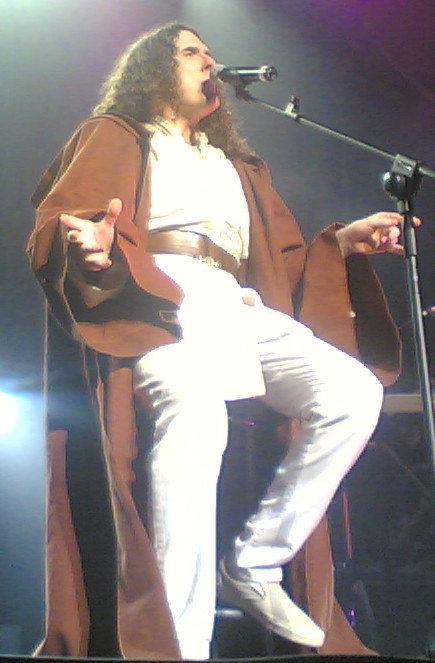Parody
 Aldous Huxley said "Parodies and caricatures are the most penetrating of criticisms." A parody, in copyright law, "is the use of some elements of a prior author's composition to create a new one that, at least in part, comments on that author's works." A parody is a kind of derivative work that does not require permission from the owner. A parody may be humorous, as with spoofs done on Saturday Night Live or in Mad Magazine. But parodies may also be serious works meant to comment or criticize another work as with Alice Randall's The Wind Done Gone, a parody of Margaret Mitchell's Gone With The Wind.
Aldous Huxley said "Parodies and caricatures are the most penetrating of criticisms." A parody, in copyright law, "is the use of some elements of a prior author's composition to create a new one that, at least in part, comments on that author's works." A parody is a kind of derivative work that does not require permission from the owner. A parody may be humorous, as with spoofs done on Saturday Night Live or in Mad Magazine. But parodies may also be serious works meant to comment or criticize another work as with Alice Randall's The Wind Done Gone, a parody of Margaret Mitchell's Gone With The Wind.
A parody can be a fair use under the Copyright Act, meaning the creator of the parody does not need the permission of the owner of the copyright in the earlier work. Some parodists, most notably "Weird Al" Yankovich, shown at right, will seek permission as a courtesy.
Even if permission is sought and refused, the fair use provision means a parody may still be made. In Campbell v. Acuff-Rose Music, Inc., 510 U.S. 569 (1994), a case before the U.S. Supreme Court about a parody of the Roy Orbison song "Oh, Pretty Woman," the parodists asked permission and were refused, then released their parody anyway. The Supreme Court found that asking permission and being denied did not negate a fair use defense to using the copyrighted work. "If the use is otherwise fair, then no permission need be sought or granted. Thus, being denied permission to use a work does not weigh against a finding of fair use."
Earlier cases did not protect parodies. Jack Benny in 1952 did a parody of the 1944 film Gaslight on his television program. He was sued by Metro-Goldwyn-Mayer, which produced Gaslight. The federal courts held that Benny was found to have infringed the studio's copyright and that his version was a parody was no defense. Loew's Inc. v. Columbia Broadcasting System, Inc., 131 F.Supp. 165 (S.D. Cal. 1955), aff'd sub. nom. Benny v. Loew's, Inc., 239 F.2d 532 (9th Cir. 1956). Campbell v. Acuff-Rose recognized that parodies were fair use. In a 2015 infringement case on a parody of the television show Three's Company, a federal judge wrote "“is designed to foster creativity. It does so by, in effect, managing monopolies in knowledge: granting one in original work to reward its creator, but ensuring it is limited, temporary, and does not operate as a moratorium on certain ideas. The law is agnostic between creators and infringers, favoring only creativity and the harvest of knowledge. Here, further protection against parody does little to promote creativity, but it places substantial inhibition upon the creativity of authors adept at using parody." Adjmi v. DLT Entertainment, Ltd., 97 F.Supp.3d 512 (S.D.N.Y. 2015).
Further Reading
-
 Copyright Law: A Work of Parody as a "Fair Use"
by
Call Number: E-bookPublication Date: 1994Short study of the issue prepared by the Congressional Research Service reviewing the copyright law and cases interpreting it as of 1994.
Copyright Law: A Work of Parody as a "Fair Use"
by
Call Number: E-bookPublication Date: 1994Short study of the issue prepared by the Congressional Research Service reviewing the copyright law and cases interpreting it as of 1994. -
Clearance and Copyright: Everything You Need to Know for Film and Television by
Call Number: Wells Library East Tower 8th Floor KF3070 .D66 2014ISBN: 9781935247128Publication Date: 2014-11-01An earlier edition of this book is available in the Maurer Law Library. This work reviews the issues on parodies and copyright law in film and television but the principles are applicable to other fields. -
Comics, Creativity and the Law by
Call Number: Maurer Law Library KF2750 .G74 2014ISBN: 9781781954928Publication Date: 2014-08-27 -
Parodies of Ownership: Hip-hop Aesthetics and Intellectual Property Law by
Call Number: E-bookISBN: 9780472070602Publication Date: 2009-06-04Print copies available at Neal-Marshall Black Culture Center Library (KF4757 .S38 2009) and IUPUI Ruth Lilly Law Library.
